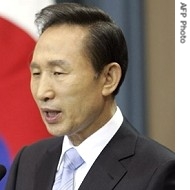-
(单词翻译:双击或拖选)
 |
| Lee Myung-bak (File) |
South Korean President Lee Myung-bak is proposing a joint2 fund of about $80 billion between South Korea, Japan and China, to shield the region from the American credit problems. Lee administration officials are expected to push for the plan on the sidelines of an International Monetary3 Fund meeting, next week. Mr. Lee is scheduled to discuss it in a three-way Beijing summit, later this month.
South Korea's Finance Minister, Kang Man-soo warned a gathering4 of bankers Monday in Seoul, it may take a long time for President Bush's signing of the financial bailout law, last week, to have positive effects. In the meantime, he is telling banks to get proactive about turning their overseas holdings into dollars that can be lent to South Korean businesses.
He is telling the business community not to rely on the government, alone. He says banks need to work their way out of the problem. He advises then to raise dollars by selling foreign assets, as soon as they can.
As in other countries, South Korea is experiencing a shortage of U.S. dollars. Its economy, the world's 13th largest, is heavily dependent on exports of goods and imports of oil, both of which are chiefly sold in dollars. Markets for even the most conservative short-term loans are constricting5 in the United States. Many financial institutions are hoarding6 dollars, in case of more trouble, and that is making it hard for companies to borrow cash for basic needs, like purchasing raw materials and expanding their business.
Jun Gwang-woo, chairman of South Korea's Financial Services Commission, urges South Korean banks not to follow suit.
He says banks should be ready to provide promising7 small and medium-sized enterprises with strong support, because they face a shortage of cash.
South Korea is arranging to help small and medium businesses with $5 billion, through various trade deals. It is also injecting ten-billion dollars into the financial system, to make it easier for banks to lend.
As an export giant, South Korea holds one of the world's largest dollar reserves, about $239 billion. These reserves have declined for six consecutive8 months, raising some preliminary alarm bells among investors9 and leaders here. South Korea's currency, the won, has fallen to its weakest level against the dollar in six years, amid fears of worsening exports.
 收听单词发音
收听单词发音
1
prospective

|
|
| adj.预期的,未来的,前瞻性的 | |
参考例句: |
|
|
|
2
joint

|
|
| adj.联合的,共同的;n.关节,接合处;v.连接,贴合 | |
参考例句: |
|
|
|
3
monetary

|
|
| adj.货币的,钱的;通货的;金融的;财政的 | |
参考例句: |
|
|
|
4
gathering

|
|
| n.集会,聚会,聚集 | |
参考例句: |
|
|
|
5
constricting

|
|
| 压缩,压紧,使收缩( constrict的现在分词 ) | |
参考例句: |
|
|
|
6
hoarding

|
|
| n.贮藏;积蓄;临时围墙;囤积v.积蓄并储藏(某物)( hoard的现在分词 ) | |
参考例句: |
|
|
|
7
promising

|
|
| adj.有希望的,有前途的 | |
参考例句: |
|
|
|
8
consecutive

|
|
| adj.连续的,联贯的,始终一贯的 | |
参考例句: |
|
|
|
9
investors

|
|
| n.投资者,出资者( investor的名词复数 ) | |
参考例句: |
|
|
|















